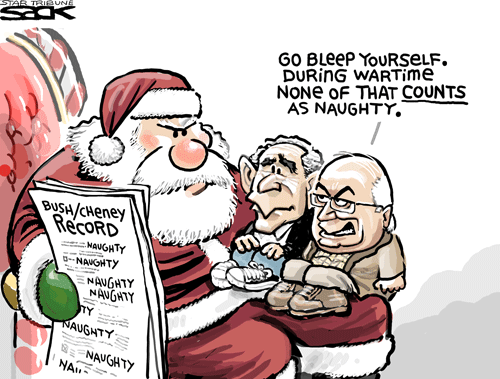Friday, December 26, 2008
NYT: Cheney Defends Bush on President’s Role

 | ||
Doug Mills/The New York Times Vice President Dick Cheney at a meeting about the auto industry on Capitol Hill this month. |
Cheney Defends Bush on President's Role
WASHINGTON — Vice President Dick Cheney on Sunday vigorously defended the White House's use of broad executive powers during the last eight years, saying he believed that historians would ultimately look favorably on the Bush administration's efforts to keep the nation safe.
Mr. Cheney said the Bush White House had been justified in expanding executive authority across a broad range of policy, including the war in Iraq, treatment of terrorism suspects and the domestic wiretapping program. And he said the president "doesn't have to check with anybody" — not Congress, not the courts — before launching a nuclear attack to defend the nation "because of the nature of the world we live in" since the terrorist strikes of Sept. 11, 2001.
The vice president also sharply criticized Vice President-elect Joseph R. Biden Jr., offering a pointed response when asked about Mr. Biden's plans to operate differently from him as vice president and about Mr. Biden's remark during the Oct. 2 vice-presidential debate with Gov. Sarah Palin of Alaska that Mr. Cheney had been "the most dangerous vice president we've had in American history."
"If he wants to diminish the office of vice president, that's obviously his call," Mr. Cheney said of Mr. Biden in an interview on "Fox News Sunday." He added that President-elect Barack Obama "will decide what he wants in a vice president."
"And apparently, from the way they're talking about it," he went on, "he does not expect him to have as consequential a role as I have had during my time."
It was the second interview that the usually media-averse vice president granted in a week, just short of a month before he and Mr. Bush are to leave office. Mr. Cheney's unapologetic tone was in marked contrast to that in several recent interviews in which the president has been reflective, expressing regrets about his failure to win passage of immigration legislation and to change the tone of the debate in Washington.
Mr. Cheney challenged Mr. Biden's knowledge of the Constitution, saying he could not "keep straight which article of the Constitution provides for the legislature, which provides for the executive." At the vice presidential debate, Mr. Biden said of Mr. Cheney, "The idea he doesn't realize that Article I of the Constitution defines the role of the vice president of the United States, that's the Executive Branch," then referred to the article's provision for the vice president's limited role in the Senate.
There is ample precedent, Mr. Cheney said, for the Bush administration's policies.
"If you think about what Abraham Lincoln did during the Civil War, what F.D.R. did during World War II. They went far beyond anything we've done in a global war on terror," he said. "But we have exercised, I think, the legitimate authority of the president under Article II of the Constitution as commander in chief in order to put in place policies and programs that have successfully defended the nation."
Mr. Cheney also said that the Supreme Court was "wrong" to override the Bush administration's initial policy of detaining terrorism suspects without granting them access to the protections of the Geneva Convention or granting them the right to challenge their detention. And he said he strongly disagreed with Mr. Bush's acceptance of Donald H. Rumsfeld's resignation as defense secretary in 2006, saying, "he did a good job for us."
"I did disagree with that decision," Mr. Cheney said. "The president doesn't always take my advice."
On "This Week" on ABC on Sunday, Mr. Biden said his primary role would be to offer Mr. Obama what he described as "the best, sagest, most accurate, most insightful advice."
The vice president-elect said he would "restore the balance" to the office, and he offered his own critical assessment of Mr. Cheney, saying the vice president's recommendations to Mr. Bush on the war and counterterrorism issues were "not healthy for our foreign policy, not healthy for our national security."
"His notion of a unitary executive," Mr. Biden said, "meaning that, in time of war, essentially all power, you know, goes to the executive, I think is dead wrong."
Mr. Biden said that he was still committed to closing the American prison at Guantánamo Bay, Cuba, and that he remained critical of the Bush administration's surveillance and detention programs, saying, "we have created, not dissuaded, more terrorists as a consequence of this policy."